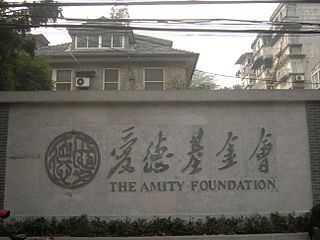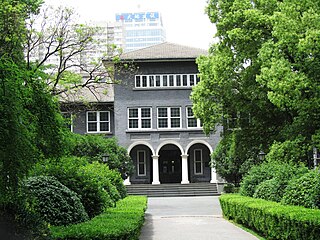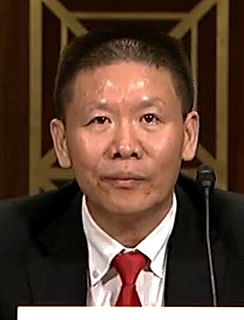Related Research Articles

A pastor is the leader of a Christian congregation who also gives advice and counsel to people from the community or congregation. In Lutheranism, Catholicism, Eastern Orthodoxy, Oriental Orthodoxy and Anglicanism, pastors are always ordained. In Methodism, pastors may be either licensed or ordained.

In China, house churches or family churches, are Protestant assemblies in the People's Republic of China that operate independently from the state-sanctioned Three-Self Patriotic Movement (TSPM) and China Christian Council (CCC). They represent a tradition of independent churches that would not come under the control of the Chinese Communist Party dating back to Wang Mingdao in the 1950's. However they came into their current form of existence after the Cultural Revolution in the early-1980s.
The Three-Self Patriotic Movement is the official government supervisory organ for Protestantism in the People's Republic of China. It is colloquially known as the Three-Self Church.
The Back to Jerusalem movement is a Christian evangelistic campaign that began in mainland China by Chinese believers to send missionaries to all of the Buddhist, Hindu, and Muslim peoples who live "between" China and Jerusalem. They believe that the Back to Jerusalem Movement is a call from God for the Chinese church to preach the gospel and establish fellowships of believers in all countries, cities, towns, and ethnic groups between China and Jerusalem.

Christianity in China has been present since at least the 3rd century, and it has gained a significant amount of influence during the last 200 years.
Protestant Christianity entered China in the early 19th century, taking root in a significant way during the Qing dynasty. Some historians consider the Taiping Rebellion to have been influenced by Protestant teachings. Since the mid-20th century, there has been an increase in the number of Christian practitioners in China. According to a survey published in 2010 there are approximately 40 million Protestants in China. As of 2019, Fenggang Yang, a sociologist of religion at Purdue University, estimated that there are around 100 million Protestant Christians in China. Other estimates place the number of Protestant Christians at around 40-60 million
Minjung theology emerged in the 1970s from the experience of South Korean Christians in the struggle for social justice. It is a people's theology, and, according to its authors, "a development of the political hermeneutics of the Gospel in terms of the Korean reality." It is part of a wider Asian theological ferment, but it was not designed for export. It "is firmly rooted in a particular situation, and growing out of the struggles of Christians who embrace their own history as well as the universal message of the Bible."

Christians in Singapore constitute 18.9% of the country's population. In 2020, about 37.1% of the country's Christians identified as Catholic and 62.9% as 'Other Christians'.

As of the year 2020, Christianity had approximately 2.3 billion adherents According to a PEW estimation in 2020, Christians made up to 2.3 billion of the worldwide population of about 7.8 billion people. It represents nearly one-third of the world's population and is the largest religion in the world, with the three largest groups of Christians being the Catholic Church, Protestantism, and the Eastern Orthodox Church. The largest Christian denomination is the Catholic Church, with 1.3 billion baptized members. The second largest Christian branch is either Protestantism, or the Eastern Orthodox Church.

Christians in Nigeria comprise an estimated 49.3% of the population. Christians are dominant in the southern (south-east/south-south/South west and central region in Nigeria. According to the Pew Research Center, Nigeria has the largest Christian population of any country in Africa, with more than 80 million persons in Nigeria belonging to the church with various denominations. The majority of Christians in Nigeria are Protestant.
Allen Yuan Xiangchen was a Chinese Protestant Christian pastor. He was acclaimed by Open Doors as "a towering figure in China's house church movement" and known for his resistance against participation in the state-sanctioned Three-Self Patriotic Movement, which resulted in imprisonment for more than twenty-one years.

The Amity Foundation is an independent Chinese voluntary organization. As of 2010 it is the largest charity in China. It was created in 1985 on the initiative of Christians in China with the late Bishop K. H. Ting as its founder. Its main objective has been to help develop poorer areas of the country. Amity's headquarters are in Nanjing. The organization includes the Amity Printing Company, the largest Bible producer in China. Amity Printing Company opened a branch in Ethiopia in 2016. Amity Foundation has an office in Hong Kong and opened a liaison office in the Ecumenical Center of the World Council of Churches in Geneva in 2017.

The Nanjing Union Theological Seminary is the flagship theological seminary of Protestant Christianity in China today. It is managed by the China Christian Council.

Bob Fu is a Chinese American pastor. In 2002, he founded China Aid, which provides legal aid to Christians in China, and has been its president since then. Bob Fu was born in Shandong in 1968 and studied English literature at Liaocheng University in the 1980s. He converted to Christianity after an American teacher gave him a biography of a Chinese Christian convert. After his studies, Fu taught English at the Central Party School in Beijing while participating in the house church movement. In 1996, Bob Fu and his family emigrated to Hong Kong and then the United States, after his wife became pregnant without the government permission to have a child. Fu founded the China Aid Association in Philadelphia in 2002, but moved its headquarters to Midland, Texas in 2004. Fu is also known for his role in helping negotiate barefoot lawyer Chen Guangcheng's immigration to the United States; in this sense, has been described as a "liaison" between oppressed groups in China and foreign governments or media that can help them.

Antireligious campaigns in China refer to the Chinese Communist Party's official promotion of state atheism, coupled with its persecution of people with spiritual or religious beliefs, in the People's Republic of China. Antireligious campaigns were launched in 1949, after the Chinese Communist Revolution, and they continue to be waged against Buddhists, Christians, Muslims, and members of other religious communities in the 21st century. State campaigns against religion have escalated since Xi Jinping became General Secretary of the Chinese Communist Party on November 15, 2012. For Christians, government decrees have mandated the widespread removal of crosses from churches, and in some cases, they have also mandated the destruction of houses of worship, such as the Catholic Three Rivers Church in the city of Wenzhou. In Tibet, similar decrees have mandated the destruction of Tibetan Buddhist monastic centers, the destruction of sacred Buddhist sites, the destruction of monastic residences, the denial of the Tibetan people's right to freely access their cultural heritage, the ongoing persecution of high Buddhist lamas and the ongoing persecution of Buddhist nuns and monks. Reports which document the existence of forced re-education camps, arrests, beatings, rape, and the destruction of religious sites in Tibet are also being published with regard to the Uyghur people, who are being subjected to an ongoing genocide.
Political theology in China includes responses from Chinese government leaders, scholars, and religious leaders who deal with the relationship between religion and politics. For two millennia, this was organized based on a Confucian understanding of religion and politics, often discussed in terms of Confucian political philosophy. At various points throughout its history, Chinese Buddhism presented an alternative to the political import of Confucianism. However, since the mid-twentieth century, communist understandings of religion have dominated the discourse.
Wang Yi, pen name Wang Shuya, is the founding pastor of the Early Rain Covenant Church, a Calvinist house church in Chengdu. He is also a productive writer, editor, and social activist, and was a legal scholar at Chengdu University before he resigned to take up the pastorate.
Jin Mingri, who is also known as Ezra Jin, is the pastor of Zion Church of Beijing a very influential independent Chinese Christian church in Beijing, China. The church started in 2007 and soon grew to over a 1,000 worshipers. Journalist Evan Osnos said Jin has a "lively televangelist flair".
References
- ↑ Weber, Jeremy (2018-09-10). "China Bans Zion, Beijing's Biggest House Church". Christianity Today .
- ↑ Spegele, Brian (2011-07-28). "China's Banned Churches Defy Regime". The Wall Street Journal . Archived from the original on 2022-03-05. Retrieved 2022-03-05.
{{cite news}}: CS1 maint: bot: original URL status unknown (link) - ↑ Shellnutt, Kate (2019-03-27). "China Shuts Down Another Big Beijing Church". Christianity Today .
- ↑ Shepherd, Christian (2018-09-09). Perry, Michael (ed.). "China outlaws large underground Protestant church in Beijing". Reuters.
- ↑ Shepherd, Christian (2018-04-29). Munroe, Tony; Feast, Lincoln (eds.). "For a 'house church' in Beijing, CCTV cameras and eviction". Reuters. Archived from the original on 2022-03-05. Retrieved 2022-03-05.